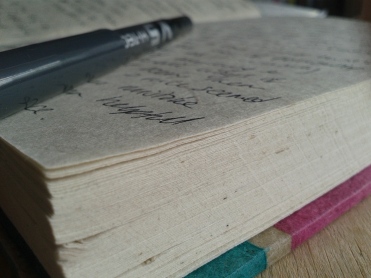it was an interesting process, launching myself into writing a poem a day for 30 days – yes i know a small amount of cheating was done! – i wrote up my learnings from the process today and i’m now wondering if they are a guide for life i could follow?
i learnt:
- even when i’m on an 11 hour shift at work with an hour commute each way, i can usually find the time to write a poem.
- to have lowered the standards of what i am willing to put ‘out there’ to others and know that i will survive it.
- that if you keep thinking about being creative and metaphor and hang onto that throughout the day, then you get lots more coming through – time thinking and mulling (even when you’re not aware of it) is as important to the process as writing it down. even essential to it. my pattern became to read the prompt then let it settle, i.e. ‘do’ nothing but see where my mind might take it throughout the day, then write something in the evening or the following morning.
- you get lots of stuff you’re sure is not your ‘best work’, but you also get more ‘best work’. some of this is just logical, more writing = more words on the page/screen, but it also feels like writing is a practice. it feels like a muscle that settles into itself the more you use it. it relaxes. there is a flow relating to creativity that happens.
- that you can ‘create’ the conditions for being creative/creating – there is this myth that we just need to hang around, just sit there, and inspiration will strike you like a lightening bolt out of nowhere, but it doesn’t seem to work like that at all. there is a quote from W. Somerset Maugham on this that is illuminating, he wrote, ‘I write only when inspiration strikes. Fortunately it strikes every morning at nine o’clock sharp.’ So, yes, inspiration can hit us but if you put in the work of climbing to the high place and putting conductors in place, you have a lot better chance of it doing so.
- it felt very revealing of my ‘self’ to put more work out there, especially when it was written quickly and mostly remains a little, or a lot, unfinished.
- i had to follow through on the promise i made to do this. i had to make my commitment work. which was sometimes a little scary, sometimes a little boring, but this kept me on track.
- the mood i approached the work in seemed to make no difference to getting an outcome and to the resulting poem. some days i felt playful and completely exhilarated by the ride. other days i felt annoyed by the whole undertaking or couldn’t be bothered. sometimes the prompt felt inspiring, other days not. i went with my moods anyway, they became part of the process, part of me.
- you can write lots and get good stuff, but the great stuff is that which ‘blows your head off’, as emily dickinson wrote, and is more rare. you know this because it feels like it is not ‘yours’ (if it ever was) or from you. you are the typist and something else is coming through. this is where writing it down becomes a doorway into another world, even if we just brush up against it, even if we have no idea where it leads or what it means.
- i learnt new techniques for ‘seeing’ poetically – i especially liked the writing a poem backwards, so that the first line you write will be the last once it is finished – this is definitely one to use again.
- i have much to say, and that’s ok.
- it started my learning which could zip off into other things, i especially found the landays wonderful and fascinating, as poems, oral tradition, to the point radicalism and women’s words.
- i learnt that using form and structure can be useful. i know about some of this, having been an english student a long time ago (i know, who’d a thunk it?!) but have always shied away from using it myself. i think i saw it as just not something i can do, a little scary and also refer to number 13 below. to approach it, court it and mess around with it has (mostly) been a joy. i still have a terzanelle in progress, which i wonder whether it would also work as song with the repetition aspect of it.
- i gave myself the task of following the prompt each day as i usually hate all the rules to do with anything and find subtle and not so subtle ways to undermine them. so, i wound my neck in and saw the prompts for what they were – a starting point. this seemd to help my focus. i realise that sometimes i mistake focus for rules and it has been helpful to consider the difference.
- i have a huge amount of raw material to work up, if i wish, or i can just leave it as the cluttered glorious mess that is life…

